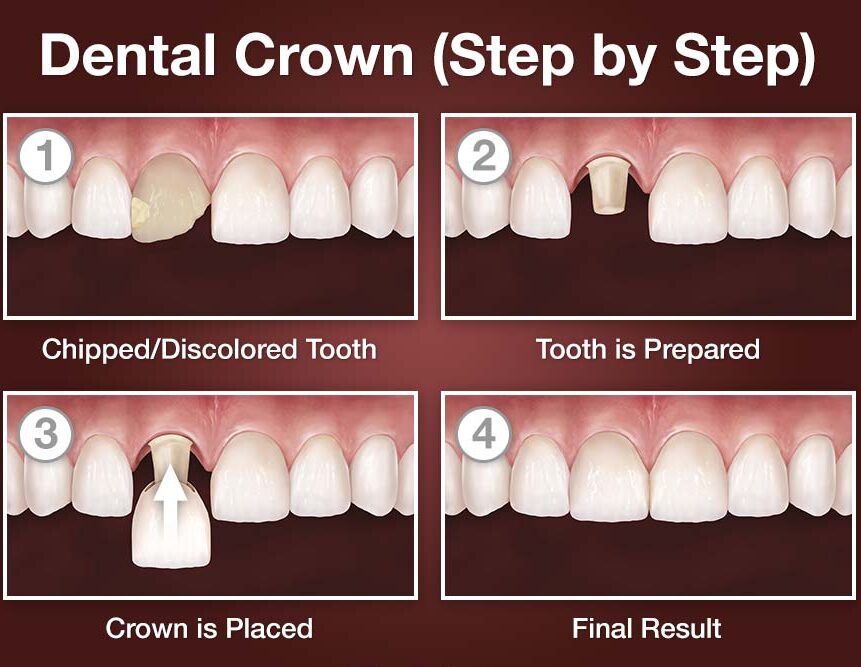What are dental crowns?
Your teeth can become damaged over time. This can happen for a variety of reasons, like tooth decay, injuries or just use over time. Your teeth can lose their shape or size. Dental crowns are tooth-shaped “caps”. That crowns can fit over your natural tooth. Think of it like a snug hat for your tooth. The crown restores the tooth’s shape, size, strength and appearance.
the crown covers your tooth’s visible portion of the dental crown

Why would I need a dental crown?
You may need a dental crown for several reasons, including:
- Protecting a weak tooth (possibly from decay) from breaking or to keep the weak tooth together
- Restoring a broken tooth or a severely worn down tooth.
- Covering and supporting a tooth with a large filling and not much tooth remaining.
- Holding a dental bridge in place.
- Covering misshapen or severely discolored teeth.
- Covering a dental implant.
- Covering a tooth that’s been treated with a root canal.
What are dental crowns made of?
Permanent crowns can be made out of many different materials. These materials can include:
- Metal: Several metals, including gold, palladium, nickel, and chromium, can be used in dental crowns. Metal crowns do not often chip or break, last the longest in terms of wear down, and require only a small amount of your tooth to be removed. They can also withstand biting and chewing forces. The metallic color is the main drawback of this type of crown. Metal crowns are a good choice for out-of-sight molars.
- Porcelain-fused-to-metal: This type of dental crown can be matched to the color of the teeth that’s next to the crown. They have a more natural tooth color. However, sometimes the metal under the crown’s porcelain cap shows through as a dark line. Other cons include the chance of the crown’s porcelain portion chipping or breaking off and the crown wearing down the teeth opposite it within the mouth. Porcelain-fused-to-metal dental crowns can be a good choice for front or back teeth.
- Zirconia: Dental crowns made out of zirconia are generally bit expensive than other crown types. However, they looks very much similar to the natural teeth.
Tooth preparation for a dental crown?
You will typically have two visits to the dentist to prepare for a dental crown. Many different materials can make permanent crowns.
The first visit
During the first visit, the dentist examines and prepares the tooth that will receive the crown. They may also take X-rays of the tooth and the bone around it. Your dentist might have to do a root canal treatment before your dental crown procedure if there’s any:
- Tooth decay.
- Risk of infection.
- Injury to the tooth’s pulp.
This will make space for the crown itself. The amount of tooth that gets filed away depends on the type of crown you have. All-metal dental crowns are thinner and don’t need as much of the tooth removed as all-porcelain or porcelain-fused-to-metal crowns. If too much of your tooth is missing — due to damage or decay — a filling material serves to “build up” enough tooth structure for the crown to cover.
The dentist reshapes the tooth and uses a paste or putty to make a copy (also known as an impression) of the tooth that will receive the crown. They also make impressions of the teeth above and below the tooth receiving the dental crown to ensure that the crown will not affect your bite.
The laboratory makes the crowns and usually returns them to the dentist’s office in few days. During this first office visit, your dentist will make a temporary crown to cover and protect the prepared tooth while you’re waiting on the permanent crown.
The second visit
During the second appointment, the dentist will cement the permanent crown onto your tooth. After removing the temporary crown, the dentist will examine the shape and shade of the permanent crown to make a final decision. If everything looks good, they may administer a local anesthetic (also known as a “numbing drug”) to the tooth to numb it before permanently cementing the replacement crown into place.
How long do dental crowns last?
On average, dental crowns last between five and 15 years. The amount of “wear and tear” a crown endures, as well as how well you practice good oral hygiene and other habits that affect your mouth, can affect the length of time a crown lasts.These mouth-related habits can include things like:
- Grinding or clenching your teeth.
- Chewing ice.
- Biting your fingernails.
- Using your teeth to open packaging.
